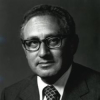Henry A. Kissinger

Henry A. Kissinger
Henry Alfred Kissingeris an American diplomat and political scientist. He served as National Security Advisor and later concurrently as United States Secretary of State in the administrations of presidents Richard Nixon and Gerald Ford. For his actions negotiating the ceasefire in Vietnam, Kissinger received the 1973 Nobel Peace Prize under controversial circumstances, with two members of the committee resigning in protest. Kissinger later sought, unsuccessfully, to return the prize. After his term, his advice has been sought by world leaders...
NationalityGerman
ProfessionStatesman
Date of Birth27 May 1923
CountryGermany
People are now starting to explain the Cold War. Even in the crises at that time the survival of millions of people was at stake. And we (the USA) had to threaten the other super power with retaliation to prevent it from doing something to us. Today we live in a world in which a lot of things are in flux. That creates a lot of fear. But it is also a time of great opportunity. And I would call on today's statesmen to not allow their thinking to be directed by fear.
Certainly nothing is easier than to rewrite history. If we had made Taiwan a separate state, it would have led to a fundamental conflict with China, and probably to war. Certainly in the long term, it would have led to war.
The Vietnam War required us to emphasize the national interest rather than abstract principles. What President Nixon and I tried to do was unnatural. And that is why we didn't make it.
I think a resumption of the Cold War would be a historic tragedy. If a conflict is avoidable, on a basis reflecting morality and security, one should try to avoid it.
When I became security advisor, I became familiar with the so-called SIOP war plans, I called in Secretary McNamara and asked him what they were hiding from me, because I couldn't believe that the National policy would foresee such a level of destructiveness.
Administration has managed the extraordinary feat of having, at one and the same time, the worst relations with our allies, the worst relations with our adversaries, and the most serious upheavals in the developing world since the end of the Second World War.
One theory is that we will make war look so attractive that we undermine the deterrent. That's Never Never Land. What we have now would have been enough to deter Hitler. But we are talking in a different order of reality.
We believe that peace is at hand.
In a nuclear war, even if one side were to come out ahead by systems analytical standards, both sides would be so weakened, that it would - they would be in the position of Europe after the two World Wars.
I would say the special experience of American wartime policy in the last 40 years, from Vietnam on, is that the war itself became controversial in the country and that the most important thing we need in the current situation is, whatever disagreements there may be on tactics, that the legitimacy of the war itself does not become a subject of controversy. We have to start with the assumption, obviously, that whatever administration is conducting a war wants to end it.
What political leaders decide, intelligence services tend to seek to justify.
No country can act wisely simultaneously in every part of the globe at every moment of time.
We fought a military war; our opponents fought a political one. We sought physical attrition; our opponents aimed for our psychological exhaustion. In the process we lost sight of one of the cardinal maxims of guerrilla war: the guerrilla wins if he does not lose. The conventional army loses if it does not win. The North Vietnamese used their armed forces the way a bull-fighter uses his cape.. to keep us lunging in areas of marginal political importance.
They [American forces] are there as an expression of the American national interest to prevent the Iranian combination of imperialism and fundamentalist ideology from dominating a region on which the energy supplies of the industrial democracies depend.